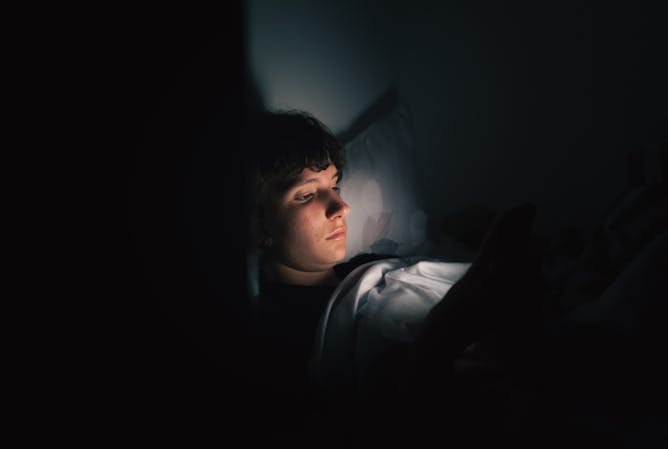|
For decades, we’ve wondered whether the increased use of mobile phones – and wireless technology more broadly – could cause health problems. Now, a major review of dozens of studies spanning 28 years has found no evidence mobile phones are linked to brain cancer.
This is great news. Mobile phones emit radio waves, and we hold these devices against the head, which is what spawned the idea there might be an increased risk. But as Sarah Loughran and Ken Karipidis report, there’s never been strong evidence for this idea. The scientific consensus is now stronger than ever.
Experts hope this latest review – commissioned by the World Health Organization – will help quell the misinformation that still persists about mobile phones and brain cancer.
|

|
Signe Dean
Science + Technology Editor
|
|

Sarah Loughran, University of Wollongong; Ken Karipidis, Monash University
We now have the strongest evidence to date that radio waves from mobile phones are not a hazard to human health.
|

Rachael Taylor, University of Otago
Parents are regularly told to limit their children’s screen time during the evening. But new research suggests it is using digital devices while in bed that is the bigger problem.
|

Sarah Jefferson, Edith Cowan University
Parents offer rewards because they think it will help a child reach a desired goal. But it is more helpful to focus on effort than ‘success’.
|

Peter Martin, Crawford School of Public Policy, Australian National University
What the Greens are proposing is really a two-tier company tax system, of the kind that once interested the Business Council of Australia and the Rudd Labor government.
|

Steve Worthington, Swinburne University of Technology
The UK Treasury called them “rip-off fees” and banned them in 2018. So how did Australians end up paying for much for card surcharges?
|

Leah Ruppanner, The University of Melbourne; Christopher Stout, Oregon State University; Kelsy Kretschmer, Oregon State University
New research shows women see their own fate as tied to that of other women - just one reason JD Vance’s attack was ill-advised.
|

Anne Kallies, RMIT University
Choosing speed above all else gets clean energy built. But it comes with risks. Which path should Australia take?
|

Ran Porat, Monash University
The mass protests are evidence that many in Israel feel abandoned by their government. Yet, Netanyahu is unlikely to shift course.
|

Mara Antic, Monash University
Choosing a top five from this year’s festival was not an easy task.
|

Kathryn Shine, Curtin University
Do the Kennedys deserve to remain a power centre in American life and politics? A disturbing new book wonders, while chronicling decades of reckless, entitled treatment of women by various Kennedy men.
|

Melissa Eaton, University of Wollongong; Verena Vaiciurgis, University of Wollongong; Yasmine Probst, University of Wollongong
Are you stuck in a cycle of endless diets? Consider these questions before starting a new one.
|
Politics + Society
|
-
Michelle Grattan, University of Canberra
After weeks of controversy, Burgess has now attempted to clean up the mess he left after his ABC Insiders interview last month.
-
Timothy Welch, University of Auckland, Waipapa Taumata Rau
The billions allocated for roads in the National Land Transport Programme will not see any actually built in the next three years.
-
Anne Twomey, University of Sydney
One of the governor-general’s roles is as commander-in-chief of the defence forces. While it’s a largely ceremonial role, she could exercise defence powers, on ministerial advice.
|
|
Health + Medicine
|
-
Sathana Dushyanthen, The University of Melbourne
When the immune system starts to break down, a virus that would normally have been under control starts to flourish. Here’s why – and what you can do about it.
|
|
Science + Technology
|
-
Haiqing Yu, RMIT University
The success of Black Myth: Wukong is fuelling China’s chip manufacturing ambitions.
|
|
Environment + Energy
|
-
Kaveh Khalilpour, University of Technology Sydney; Alexey Voinov, University of Twente
Seeing solar around your neighbourhood is a surprisingly large reason you might choose to do the same.
|
|
Education
|
-
Timothy McKenry, Australian Catholic University
When it comes to starting lessons, research says ‘the sooner the better’. But pinpointing a precise age depends on a range of factors.
|
|
Arts + Culture
|
-
Russell Fewster, University of South Australia
Jack Hibberd has died at age 84. As part of Australian theatre’s New Wave he was a crucial playwright in exploring how we saw ourselves as Australians.
|
|
Books + Ideas
|
-
Amanda Tink, University of South Australia
Steve Silberman, much loved for his transfomative, acclaimed autism book Neurotribes, as well as his writing on the Grateful Dead, has died, aged 66. Autistic writer Amanda Tink pays tribute.
|
|
Business + Economy
|
-
John Simon, Macquarie University
To boost Australians’ trust in an institution that’s central to all our lives, the Reserve Bank needs more transparent processes to explain its decisions.
|
|
| |
|
|
|
Royal Australian and New Zealand College of Ophthalmologists
Anywhere
•
Part Time
|

|
|
|
|
| |
| |

|
| |
| |
| |
Featured Events, Courses & Podcasts
|
View all
|
|
|
|

|
11 September 2024
•
Sandy Bay
|

|
17 September 2024
•
Melbourne
|

|
18 - 19 September 2024
•
Sydney
|

|
|
|
|
| |
| |
| |
| |
| |
|
|